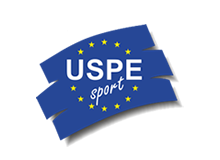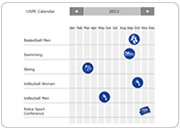| Anti-Doping Regulations of the Union Sportive des Polices d’Europe (USPE) |
>> (PDF) Anti-Doping Regulations of the Union Sportive des Polices d’Europe (USPE)
Article 1
In accordance with the World Anti-Doping Code and for the purpose of protecting the health of the male and female athletes, the European Police Sports Association joins in the fight against doping. These regulations are based on the 2015 World Anti-Doping Code. In addition, the rules and regulations of the National Anti-Doping Agency of the country in which the registered office of the USPE is located shall apply.
Any reference made to “athlete” shall imply to both male and female athletes hereinafter.
Article 2
Doping is the occurrence of one or more of the anti-doping rule violations set forth in the 2015 World Anti-Doping Code and incorporated in the respective national anti-doping rules and regulations.
PART I: TESTING
Article 3
All member nations, all officials of the USPE as well all members of the delegations participating in USPE competitions shall be obliged to ensure implementation of the World Anti-Doping Code and to support the rulings passed by the disciplinary bodies.
Should the athlete have been granted a Therapeutic Use Exemption (TUE) stating that a drug/agent has to be taken for medical reasons, this TUE shall be submitted to the Secretary General or the competent USPE representative in due time no later than one day prior to the first competition.
Apart from the respective national anti-doping agencies, the USPE Medical Commission is responsible for granting a TUE.
Article 4
Doping control may be ordered by the Executive Committee of the USPE, the USPE member nation organizing a European Police Championship, the national anti-doping organization of the country where the event takes place, by WADA, EOC or by the competent minister of this country.
Article 5
During championships and the respective qualifying rounds, the Executive Committee of the USPE may designate a member of the EC or TC, or the Anti-Doping Commissioner of USPE, a representative of a member nation, a national coach or a referee as USPE representative for the purpose of supporting the accredited physician if the latter requests so.
Members of the Disciplinary Tribunal or the Disciplinary Court of Appeal may not be appointed USPE representative.
PART II: BODIES AND DISCIPLINARY PROCEEDINGS
Section 1: Joint provisions applicable to the Disciplinary Tribunal of first instance and the Disciplinary Court of Appeal
Article 6
A Disciplinary Tribunal of first instance and a Disciplinary Court of Appeal shall be established and wield disciplinary power over the members of the USPE that have violated the Anti-Doping Regulations.
Both bodies shall be composed of five members each. The latter shall be selected on the basis of their respective qualifications. At least one member of each group shall come from the field of sports medicine with experience in handling the Anti-Doping Code; at least one member shall be chosen due to his/her legal competences. A further member may be a member of the Executive Committee or the Technical Commission of the USPE.
The President and Secretary-General of the USPE must not be members of any of the disciplinary bodies.
The members of the disciplinary bodies and their chairs shall be appointed by the Executive Committee of the USPE at the suggestion of the Secretary-General for a period of four years.
They may be reappointed twice for another four-year term, respectively.
In the event of the absence of the chairperson, the oldest member shall chair the respective meeting of the Disciplinary Tribunal.
In the event of a member retiring from the body, a new member shall be appointed for the remaining term of office.
The disciplinary bodies are to maintain contact with the USPE Anti-Doping Commissioner.
The USPE Anti-Doping Commissioner shall be invited to the meetings of the disciplinary bodies.
Article 7
Members of the Disciplinary Court of Appeal must not simultaneously be members of the Disciplinary Tribunal.
Article 8
The Disciplinary Tribunal of first instance and the Disciplinary Court of Appeal shall be convened by their respective chairs. Each body shall only have a quorum, when a minimum of three members of the body are present.
The Secretary-General shall charge somebody to take the minutes.
In the event of a tie, the chair shall have the casting vote.
Article 9
The hearings of the Disciplinary Tribunal shall not be open to the public, unless this is required by the athlete or his counsel prior to the opening of the session.
Article 10
The members of the disciplinary bodies shall be obliged to maintain secrecy regarding the facts, files and information disclosed to them during the exercise of their duties.
Any violation of this provision shall result in the exclusion of the respective member of the Disciplinary Tribunal on the proposal of the Secretary-General.
Section 2: Rules and regulations applicable to the Disciplinary Tribunal of first instance
Article 11
The Secretary-General shall be entrusted with investigating the matter submitted to the Disciplinary Tribunal of first instance. He shall be obliged to maintain secrecy as to the facts, files and information disclosed to him during his enquiries.
The President of the USPE shall authorize him to engage in any correspondence required for examining the matter at hand.
Article 12
In the event of a violation of the provisions set forth in the Anti-Doping Regulations, the President of the USPE shall forward the following documents to the Secretary-General:
1. the doping control officer report drawn up by the the doping control officer, outlining the conditions under which the testing was conducted;
2. the sample analysis report by the accredited doping control laboratory, outlining the analytical findings.
Article 13
Should an athlete be suspected of having violated one of the Anti-Doping Regulations, the Secretary-General shall notify him/her of this fact and of the institution of proceedings against him/her in writing by registered mail with advice of receipt. The athlete shall be entitled to comment on these accusations in writing within seven working days after receipt of the registered letter.
At the same time, the president of the athlete's member nation as well as the USPE Anti-Doping Commissioner shall be informed of the institution of proceedings
Article 14
The registered letter outlining the facts of the alleged violation must either contain the analytical findings or the control report indicating other the respective anti-doping rule violation.
The athlete shall be advised of the fact that within seven working days after this notification, he/she shall have the right to request the B-sample analysis to be conducted in accordance with the conditions set forth in the Anti-Doping Regulations at his/her expense by sending a registered letter with advice of receipt.
The date of the B sample analysis shall be fixed in consultation with the accredited doping control laboratory and, if necessary, in consultation with the expert called in by the athlete in compliance with the period of time stipulated in the regulations. The athlete shall have the right to be present during the analysis. The analytical findings shall be communicated to the athlete pursuant to the conditions set forth in the Anti-Doping Regulations.
Should the analysis of the B-sample fail to confirm the analytical findings of the A-sample, the proceedings shall be dropped.
Article 15
If the B-sample analysis confirms the result of the A-sample analysis, the Secretary General shall draw up a report within a period of four weeks after the result of the B-sample and send it to the members of the Disciplinary Tribunal.
Article 16
No later than fourteen days prior to the date of the hearing, the Secretary-General shall summon the athlete before the Disciplinary Tribunal by registered mail with advice of receipt.
The athlete shall have the right to be represented by a lawyer at his/her own expense.
Should the athlete not speak any of the three official languages of the USPE or have problems making him-/herself understood, they may refer to the assistance of an interpreter at their own expense.
The President of the athlete’s member nation or a representative appointed by the latter shall be notified of the date of the hearing and have the right to attend the session of the Disciplinary Tribunal.
Prior to the hearing, the athlete or his counsel may take a look at the report and the entire file. The athlete or his counsel may demand that persons of their choice who have to be named to the Disciplinary Tribunal no later than eight days before the hearing be heard.
The chair of the Disciplinary Tribunal may reject requests for a hearing of witnesses if he deems these requests as abusive.
Article 17
During the hearing, the Anti-Doping Commissioner or the Secretary-General of USPE shall present their report.
The chair of the Disciplinary Tribunal may hear any person whose statement appears to be useful in his eyes. Once such a hearing is decided, the chair shall notify the athlete accordingly prior to this hearing.
The athlete and, if applicable, his counsel have the last word.
Article 18
The discussions of the Disciplinary Tribunal shall take place without the athlete, his counsel, the representative of his/her member nation, the persons heard during the session, the Anti-Doping Commissioner or the Secretary-General of USPE being present. The Disciplinary Tribunal shall pass a reasoned decision.
This decision shall be signed by the chair and the minutes-secretary.
Article 19
The Disciplinary Tribunal shall pass its decision no later than 14 days after the last oral proceedings.
Thereupon, this decision shall be served on the athlete by registered mail with advice of receipt. The served documents shall contain the remedies for appeal as well as the periods allowed for appeal.
If the decision is not announced within this period, the file shall be taken out of the hands of the Disciplinary Tribunal and sent to the Disciplinary Court of Appeal.
The decision shall be forwarded by registered/signed for mail to the athlete, the national police sports association, WADA, the international sports federation, the National Anti-Doping Agency (NADA), and the respective national sports federation.
Moreover, it shall be published both on the website and in the magazine of the USPE.
Article 20
Articles 11 through 19 shall also apply to the athlete support personnel who are authorised by a USPE member union and have violated the anti-doping regulations according to the Word Anti-Doping Code.
Article 21
Articles 11 through 19 shall also apply to athletes who have violated the anti-doping regulations other than the presence of a substance or a method in the biological sample of the police athlete.
Article 22
The Disciplinary Tribunal may refrain from oral proceedings and take a decision on the basis of a written procedure, when the athlete accused of having violated an Anti-Doping Regulation has given his/her written consent accordingly.
Section 3: Rules and regulations applicable to the Disciplinary Court of Appeal
Article 23
Within a period of 21 days, the athlete, the member nation and the President of the USPE may appeal against the decision taken by the Disciplinary Tribunal.
The right to appeal enjoyed by the athlete and the member nation may only be exercised upon payment of a certain amount of money to the USPE.
The appeal shall not suspend the effect of the decision, unless the Disciplinary Tribunal has decided otherwise.
In the event of the appeal being lodged by a member nation or the President of the USPE, the Disciplinary Court of Appeal shall notify the athlete accordingly and set a time limit within which the athlete may prepare his/her comments.
The Secretary-General or the USPE representative in charge of the enquiry shall send the files to the chair of the Disciplinary Court of Appeal.
Article 24
The Disciplinary Court of Appeal shall decide in the last instance.
The chair shall appoint the Anti-Doping Commissioner or the Secretary General as reporter who shall brief the members of this body on the previous course of proceedings. This report shall be given before the hearing. The Secretary General shall also charge somebody to take the minutes.
The Disciplinary Court of Appeal shall announce its ruling by taking into account the decision taken by the Disciplinary Tribunal and the appeal. The decision shall be signed by the chair and the minutes-secretary.
With the exception of the first paragraph of Article 17 and the last two sentences of Article 18, the provisions stipulated in Articles 16 through 18 and 22 shall also apply to the Disciplinary Court of Appeal.
The Disciplinary Court of Appeal shall announce its decision no later than fourteen days after the last hearing.
Article 25
The decision shall be forwarded by registered/signed for mail to the athlete, the national police sports association, WADA, the international sports federation, the National Anti-Doping Agency (NADA) and the respective national sports federation.
In addition, the decision shall be published on the website and in the magazine of the USPE.
PART III: DISCIPLINARY SANCTIONS
Article 26: AUTOMATIC DISQUALIFICATION OF INDIVIDUAL RESULTS
Automatic disqualification of individual results is always imposed in accordance with Article 9 in the 2015 World Anti-Doping Code as amended from time to time.
Article 27: SANCTIONS ON INDIVIDUALS
Sanctions on individuals are always imposed in accordance with Article 10 in the 2015 World Anti-Doping Code as amended from time to time.
Article 28: CONSEQUENCES TO TEAMS
Consequences to teams are always imposed in accordance with Article 11 in the 2015 World Anti-Doping Code as amended from time to time.
Article 29
The Disciplinary Tribunal or Disciplinary Court of Appeal may decide that the athlete, in addition to the punishment according to the 2015 World Anti-Doping Code, also shall be excluded from participation in the European Police Championships in a period of 4 years.
Article 30
In the event of a case stipulated in Articles 20 or 21, the sanctions set forth in Article 27 shall apply.
Article 31
The Executive Committee shall decide on the payment of the costs of the proceedings by referring to a scale of charges.
Article 32
The rules and regulations of the national anti-doping agency of the country in which the registered office of the General Secretariat of the USPE is located shall apply analogously to all cases not covered by these regulations.
The Anti-Doping-Regulations were approved by the USPE Congress 2014 and will enter into force on 1st January 2015.




